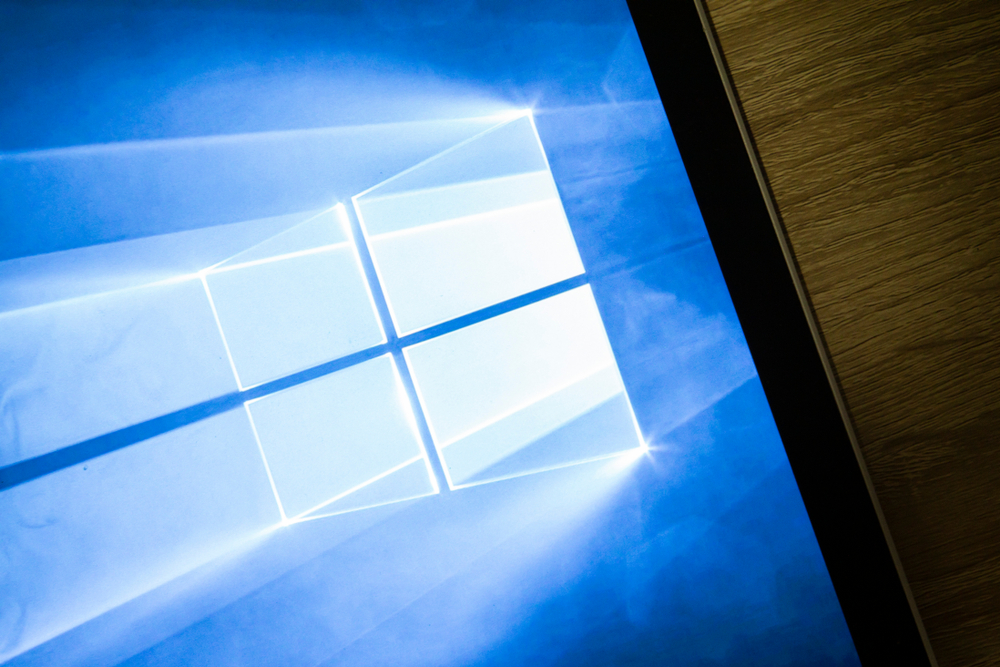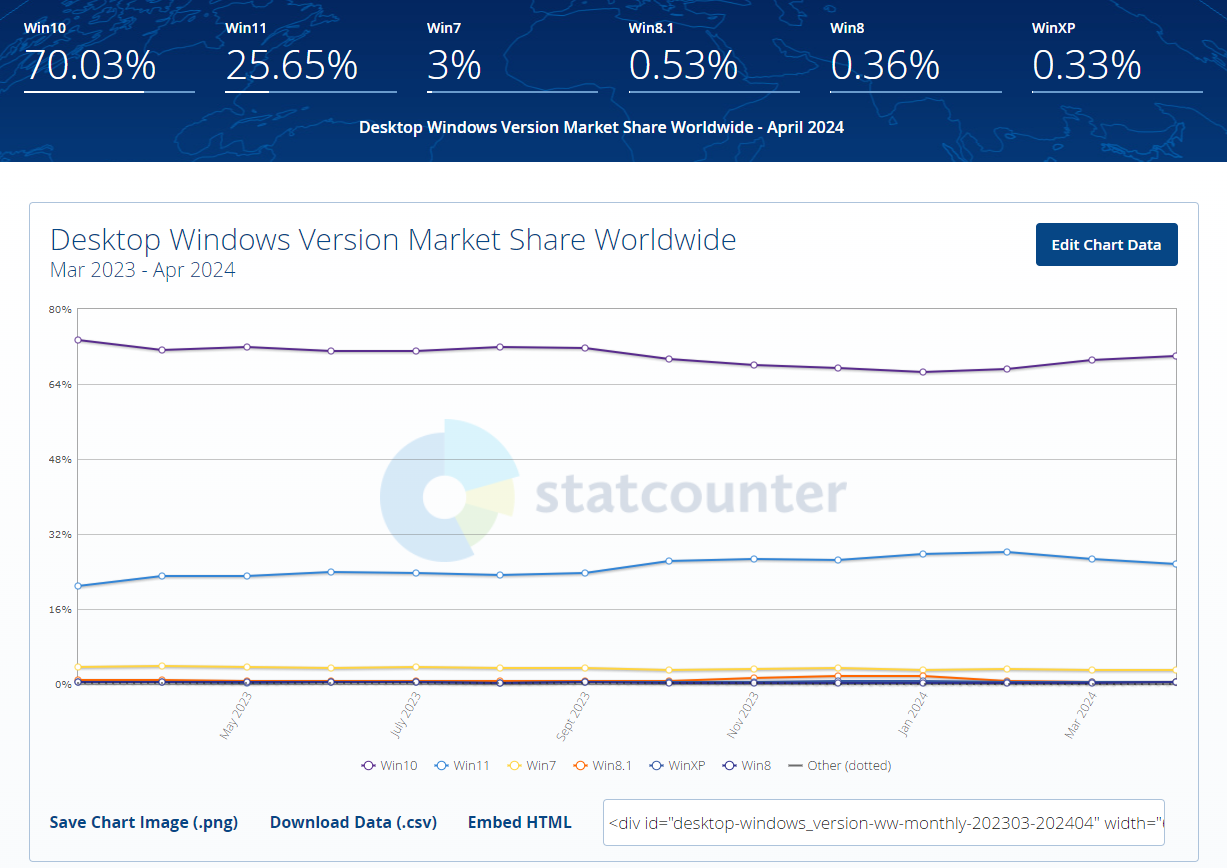Windows 11 market share declines as users seemingly shift back to Windows 10
Microsoft still can't make users shift to Windows 11

Statcounter released a new report showing a noticeable decrease in Windows 11's worldwide market share since Feb 2024. The struggling Windows 11 fell below 26% while Windows 10 enjoyed 70.03% of Microsoft's OS market share.
This latest report reveals a drop of 0.97 points which translates from 26.68% to 25.65% while showing a corresponding increase in Windows 10. It's clear that many users don't see the appeal of shifting to Windows 11, despite many efforts by Microsoft to force migration and a series of updates and new features as it doesn't enhance their experience or improve their quality of life. Despite being released on October 5, 2021, many users (and one has to imagine, businesses) are content with Windows 10. In comparison, Windows 10 is a nine-year-old operating system whose last version is the only one supported until October 14, 2025. It also shows nothing significant has changed since the last time we reported about these stats last year.
Although these stats may look contrary to Steam's survey about OS market share, Statcounter would show an overall market share among general users and businesses of all sizes. Surveys of such a large scale may not be accurate to the tip, however, it does reflect close enough statistics to make a safe conclusion of the overall market share. The gradual growth of Windows 10 users while Windows 11 decreases during April 2024 reflects users' opinions about these operating systems.

Windows 11 Unlikely to Boost OS Market Share
Microsoft will need to accept that it is unlikely to see increased market share due to enhancements from Windows 11 24H2 once released as most users wouldn't need AI (or detest it). Above all, existing Windows 11 users and its former developers complained about the basic functions of Windows 11, raising doubts about Microsoft's inability to listen to user's issues about it. Microsoft also seems to be testing its existing user's patience about the possibility of blocking UI-altering apps and other applications.
What's also interesting is that the long-obsolete Windows 7 can be seen enjoying a certain market share over Windows 8.0 and 8.1. Many users didn't see any reason to shift towards Windows 8.0 for multiple reasons, prompting Microsoft to bring back certain ommissions in Windows 8.1, which was still not enough to get people to migrate. In comparison, many users shifted from Windows XP to Windows 7 gradually- and the same for those who shifted to Windows 10.
There is a certain observable fact here that Microsoft can benefit if it can provide reasons for a gradual migration to Windows 11. But if Microsoft chooses to count on forceful tactics, it would likely leave a bad taste among consumers. If people don't wish to 'upgrade' despite being on a platform that's in its last year to receive updates, it's up to Microsoft to convince them otherwise.
Get Tom's Hardware's best news and in-depth reviews, straight to your inbox.

Roshan Ashraf Shaikh has been in the Indian PC hardware community since the early 2000s and has been building PCs, contributing to many Indian tech forums, & blogs. He operated Hardware BBQ for 11 years and wrote news for eTeknix & TweakTown before joining Tom's Hardware team. Besides tech, he is interested in fighting games, movies, anime, and mechanical watches.
-
slightnitpick Replyraising doubts about Microsoft's inability to listen
Accidental double negative. We don't doubt MS's inability to listen. -
sadsteve The only thing that's made Win 11 palatable to me is running Open Shell and ExplorerPatcher. If those programs didn't exist, I'd still be running Win 10.Reply -
JamesJones44 I ended up going back to 10. MS never fixed the shutter issue a lot of people are having with Hyper-V and some frame shuttering that occurs with various games (Microsoft Flight Simulator for example). None of those issues exist for me when using Windows 10. I've tested Win 11 every new release and those issues still exist. I'm not the only one, a quick search will show people having similar issues with Win 11, but works fine with Win 10.Reply -
hotaru251 WIN11's "perks" were: the native app store & direct storage..both of which will supported on WIN10. (and the app failing to be good)Reply
Every other WIN11 change is a straight downgrade from 10.
MS should of learned from XP & then 8....people do NOT like "upgrading" to a worse experience (vista & 7) nor do they like changing soemthing they got use to over 10-20+ yrs.
Forced updates, forcing cortana, future of forcing ai/llms into windows, telemetry, etc....nobody wants to deal with it so they have no reason to move to a newer version so long as odler one still functions. -
ET3D ReplyWhat's also interesting is that the long-obsolete Windows 7 can be seen enjoying a certain market share over Windows 8.0 and 8.1.
What's more interesting is that in the stats Windows 8 has been going up for the past couple of months, from 0.22% to 0.28% to 0.36%. Win 8.1 has gone up from 0.61% in September 2023 to 1.73% in January 2024, then dropped to 0.44% in March and the up to 0.53% in April.
All of which goes to suggest that the stats aren't a true representation of OS use. We know that the Steam survey varies a lot with the sampling. I'm not sure how this survey is done, but it might suffer from similar ills. -
in_the_loop Reply
I completely disagree.hotaru251 said:WIN11's "perks" were: the native app store & direct storage..both of which will supported on WIN10. (and the app failing to be good)
Every other WIN11 change is a straight downgrade from 10.
MS should of learned from XP & then 8....people do NOT like "upgrading" to a worse experience (vista & 7) nor do they like changing soemthing they got use to over 10-20+ yrs.
Forced updates, forcing cortana, future of forcing ai/llms into windows, telemetry, etc....nobody wants to deal with it so they have no reason to move to a newer version so long as odler one still functions.
For starters, Windows 11 is much superior to 10 for us with multiple monitors.
Second, for us with the newer Intel processors that have P and E-cores, Windows 11 is a must to run. Windows 10 isn't optimized for them.
I also like Windows 11:s task manager better.
More things have moved to the newer settings part of windows.
I feel like it starts quicker and is overall snappier.
It is more optimized than 10 and has lower requirements.
For most things though it is almost similar to Windows 10 so for me it only has advantages and besides that is very similar to 10. -
Silas Sanchez Going win10 at its end of life i really questioned this for my pc, but 11 is just a bridge too far and it has just gotten worse and worse. its too different that many older stuff wont run, the explorer layout is for me awful. The M$ doctrine is de evolve, break, re invent, they have ruined windows and they cant come up with real innovation. I have 10 setup so well even got old vista wmp11 back, defender the menace is gone, now my hdds wont die in 2years!. Lets make 10 popular! and so M$ can actually focus on fixing it's awful flaws.Reply -
wpontius18 Clearly Microsoft has little if any concern for user satisfaction or input. I have been running Windows 11 since its release and don't find it dramatically different to Windows 10. Most changes are minor cosmetic, functional and menu changes in Settings requiring small changes in my behavior and use. Have not liked the start menu since the Windows 8 & 8.1 changes, but the programs to change the start menu seem to cause additional problems that make tolerating the start menu as-is a better option.Reply
I don't find the strict hardware requirements of Windows 11 give it any security benefit over Windows 10, with Secure Boot and TPM supported. The minor internal changes to Windows 11 don't seem to offer any more protection than the hardening of Windows 10 would. These hardware requirements will only accomplish increasing the e-waste problem over the next 5 years. -
umeng2002_2 I still like how Windows 11 auto-hides all new taskbar icons; so every time you install a new program, you have to remember to unhide the icon.Reply -
cryoburner The people writing these articles need to think a bit more about what they are posting, rather than just rehashing something they saw posted elsewhere online. It should be obvious just from the chart in the article that the statcounter data is flawed, and most definitely not accurate enough to interpret meaningful month-to-month trends from. There's no logical reason why the number of systems running Windows 8.1 would have randomly rose significantly for a few months, only to drop back to almost nothing immediately thereafter. That should be a red flag that the data is unreliable right there.Reply
Likewise, seeing Windows 11 usage slowly rising over the course of a year, while Windows 10 usage was slowly dropping, only for the two to reverse direction within the last couple months. Clearly, people are not moving from Windows 11 to Windows 10 in significant numbers, at least not enough to reverse the overall trend. This could be anything from a browser not reporting accurate OS data, to statcounter getting added to some popular website in a country with a larger install base of older systems. Keep in mind that statcounter is used on less than 1% of websites, and counts individual page views rather than unique systems, so there's a lot of room for inaccuracy to come into play.
As for people not adopting Windows 11 all that quickly, that makes perfect sense. Generally, most won't see the need to go out of their way to update their OS to a new version unless they are moving to a new PC that just happens to have it preinstalled, and there are still many perfectly functional systems that can't install the updated OS due to hardware restrictions. And there hasn't really been much of a pressing need to upgrade to newer hardware over the last couple years, with existing hardware still being very capable of handing most people's needs, and with many who were looking to upgrade having already done so around the time of the lockdowns. And Windows 11 so far hasn't done all that much beyond being Windows 10 with a new coat of paint, so those outside of the tech community haven't exactly had much incentive to try it on their existing systems.